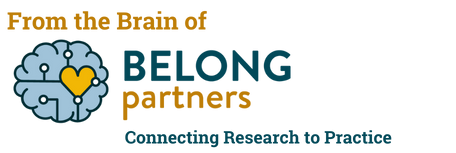In our adult-led culture, it can feel counterintuitive to some adults to make space for youth voice – for young people to lead their educational experience. But if we look at what is happening around the world, we see young people leading in amazing ways. There are many examples of young people using their voices to drive change within classrooms and in various other important arenas.

At BELONG Partners, we passionately believe that inviting youth voice and agency into the classroom increases student buy-in and nurtures their self-worth. There is extensive research supporting this belief.
Youth voice encourages student engagement, fosters communication skills, and cultivates leadership. Educators have many opportunities to strongly support students’ social-emotional growth by stepping aside to allow youth voice and agency to lead the way.
The Importance of Belonging
The work of psychotherapist Alfred Adler emphasizes the importance of opportunities to meaningfully contribute to our social environments to foster a sense of belonging. Belonging is crucial to youth development. Young people are experts of their own experiences. Authentically listening to their perspectives not only helps strengthen relationships between educators and students, but it also builds community among the students.
Amplifying Student Voice
As educators, we often hear that it is our job to empower students. They are inherently powerful. It falls on us to create space for their powerful contributions to the classroom community, whether that means eliciting feedback about what content they want to learn about or by inviting them to step into leadership roles in the classroom.
The magic happens not only when we make space to listen to young people, but when we genuinely partner with young people and integrate their ideas and wisdom into our classroom culture and learning content. Sharing their ideas may initially feel vulnerable and scary for young people. Educators can work to build a safe classroom environment through building authentic relationships and co-creating classroom routines. Here are a few examples of schools effectively doing this vital work.
Unlearning Adultism
A fundamental step in genuinely centering youth voice and agency is interrogating adultism. Adultism refers to the often-unconscious assumption that young people are inferior to adults, and, like many biases, it is deeply ingrained into the fabric of our society. Similar to how we encourage students to self-reflect, we must do the internal work of unlearning our own biases and beliefs.
According to our friends at Education Northwest, we can work to eradicate adultism within ourselves by “being mindful of how we might perpetuate adultism and, in turn, diminish the value and contributions of the young people with whom we work.” By checking our own biases, we can more effectively level power dynamics in the classroom.
At BELONG Partners, our purpose is to build equitable communities that center the dignity, voice, and agency of young people. By recognizing and encouraging the inherent power of youth voice and the unique ideas of young people, we all grow in our learning communities and move those environments towards becoming truly equitable.
Check out our Services page for more information about how we work with schools and community organizations.
Research cited in this article includes:
7 Ways to Promote Student Voice in the Classroom | ThoughtExchange. (2022, May 23). Thoughtexchange.com. https://thoughtexchange.com/blog/student-voice-in-the-classroom/
Alfred Adler History. (2021, June 15). Adler University. https://www.adler.edu/alfred-adler-history/
jkipnis@gradientlearning.org. (2021, October 6). How teachers can create a safe space for student voices. Along. https://www.along.org/blog/how-teachers-can-create-a-safe-space-for-student-voices/
Miller, A. (2016, January 25). Voice and Choice: It’s More Than Just “What.” Edutopia; George Lucas Educational Foundation. https://www.edutopia.org/blog/voice-and-choice-more-than-what-andrew-miller
Ngo, N. (2021, March 18). Youth Voice and Agency: The Way to a Brighter Future. ExpandED Schools. https://www.expandedschools.org/youth-voice-and-agency-the-way-to-a-brighter-future/
Northwest, E. (n.d.). It’s on Adults to Make Space for Youth Voice. Education Northwest. https://educationnorthwest.org/insights/its-adults-make-space-youth-voice
https://upforlearning.org/wp-content/uploads/2021/04/UP-64ways-web-1.pdf
